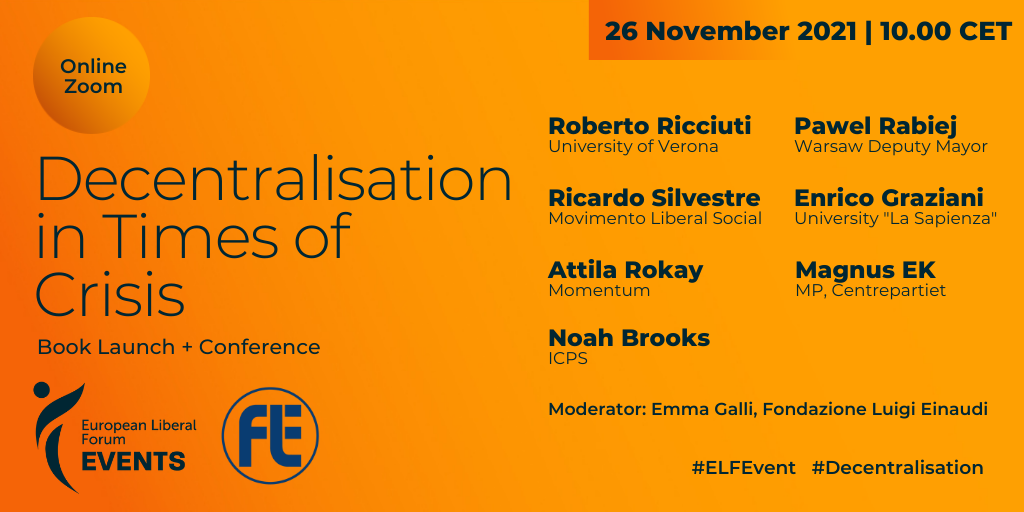L’evento ha riguardato la presentazione del libro “Decentralisation in Times of Crisis”, pubblicato da European Liberal Forum in cooperazione con la Fondazione Luigi Einaudi e Paddy Ashdown Forum. Nel corso della conferenza, gli speakers, provenienti da diversi paesi dell’Unione Europea, hanno presentato i loro contributi, analizzando il livello di decentralizzazione nei loro paesi – da punto di vista politico, economico, sociale e giuridico.
The event concerned the presentation of the book “Decentralisation in Times of Crisis”, published by the European Liberal Forum in cooperation with Fondazione Luigi Einaudi and Paddy Ashdown Forum. During the a conference the speakers, from several EU countries, assessed the current situation of decentralisation in their countries – either on a political, economic, social or legal point of views.
Context
During the recent COVID-19 pandemic the issue of the intergovernmental relations has been called into question on several occasions. In situations of emergency a decentralised architecture of the government constraints the central government’s power through competition among different levels of government. Therefore, it is crucial to reconsider the role of government in the European democracies and the necessity to protect civil liberties and economic freedom through the activity of different levels of government which interact and confront the central government’s power and, if necessary, limit it. Indeed, small and competing jurisdictions may transform the decentralised architecture into a laboratory of public policies where there is trial-and-error learning from experimentation and also an induced competitive effect for the selection of good politicians, implying an accountability improvement.
The choice between centralisation and decentralisation depends on the trade-off between the inefficiencies derived from the uniform policies and those derived from the lack of coordination at local level. The differentiation of situations and the information available locally favour the role of the sub-national governments and may be a multiplier of the economic and social growth.
The project aims to compare the experiences of different models of government (centralised, decentralised, mixed) in Europe in the phase of the emergency, and that of the recovery in terms of innovation and differentiation of the policies and limitation of the Leviathan’s power.
The project will:
· Assess the benefits of competition among several levels of government versus a centralised governance in terms of policies innovation and differentiation in emergency situations;
· Focus on the role of decentralization in preserving the liberties with respect to the power of the central government;
· Compare the experiences of different models of government (centralised, decentralised, mixed) in Europe on both fronts.
About the event
The event consists in the presentation of the book “Decentralisation in Times of Crisis”, published by the European Liberal Forum in cooperation with Fondazione Luigi Einaudi and Paddy Ashdown Forum, and in a conference where speakers from several EU countries assess the current situation of decentralisation in their countries – either on a political, economic, social or legal point of views.
Friday, November 26th.
10:00 Introductory Remarks and presentation of the book (TBC)
Speaker: Marco Mariani, European Liberal Forum Board Member
Conference Moderator
Emma Galli, Scientific Director of the Fondazione Luigi Einaudi
10:15 – The case of Italy – An economic perspective
Speaker: Prof. Roberto Ricciuti, University of Rome la Sapienza
10:45 – The failure of recentralization. How pandemic dispelled the illusions of government
omnipotence in Poland.
Speaker: Pawel Rabiej, Deputy Major of Warsaw
11:15 – Coffee break
11.30 – The case of Portugal
Speaker: Ricardo Silvestre, Movimento Liberal Social
12:00 – The case of Hungary.
Speaker: Attila Rokay, Deputy on Anti-Corruption, Momentum.
12:30 – Q&A and discussion with the speakers
13:00 – Lunch Break
14:00 – The case of Sweden
Speaker: Magnus Ek, Member of the Swedish Parliament and Environmental Policy Spokesperson
14:30 – The case of Italy – A political perspective.
Speaker: Prof. Enrico Graziani, University of Rome la Sapienza
15:00 – The case of Czech Republic.
Speaker: Noah Brooks, Chairman of the Board of Trustees, Institute for Politics and Society
15:30 – Coffee Break
15:45 – Q&A and debate with the speakers
16:45 – Highlights of the findings and conclusive remarks
Emma Galli, Scientific Director of the Fondazione Luigi Einaudi
17:00 – End of the event



